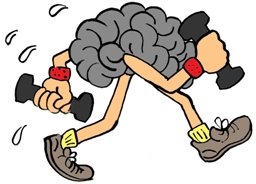 We all hope to get older. Naturally, we all wish we could stay young forever, but there are only two alternatives – getting older or . . . not. We’ve heard it said that getting older is not for sissies. Even into our forties we begin to realize that no truer statement has ever been uttered.
We all hope to get older. Naturally, we all wish we could stay young forever, but there are only two alternatives – getting older or . . . not. We’ve heard it said that getting older is not for sissies. Even into our forties we begin to realize that no truer statement has ever been uttered.
However the advantages of getting on in years can play in our favor if – and that is a major “if” we have a healthy brain. Of course, there are other factors to growing old with grace, but if our minds are operating on all cylinders then we are able to make robust and effective choices as we go.
Protecting our brains has never been more at the forefront of society than it is today. We all know of someone who is suffering dementia or Alzheimer’s. Unfortunately, we haven’t developed an effective way to manage that and burn those troubles out of our lives completely. Just a few generations back, these cognitive disorders weren’t nearly as prevalent in society as they are now. Other internal plumbing seemed to give out before our brains let us down. Sure these conditions were still a part of life, but more infrequent than today’s commonplace.
Preventative Measures
This may come as no surprise to many of you, but one of the most highly recommended measures to take when warding off dementia and other cognitive disorders, is exercise. Exercise seems to be the overall answer to quite a few of our physical ailments. For you couch spuds this doesn’t come as good news even if you spend your down time reading the the encyclopedia. The research has shown for years that certain amounts of physical exercise is good for aging brains.
If you are regularly active with some form of physical discipline it will help ward off fading memory. Especially with vascular dementia, where a person’s memory loss is due to mini strokes. Research finds that some form of exercise plays a big role with maintaining a healthy brain. Physical activity helps lower levels of toxic tau proteins as it also increases blood flow, lowering the risk of losing mental avidity.
Stephen Rao, PhD, the director of the Schey Center for Cognitive Neuroimaging at the Cleveland Clinic says “Exercise is, right now, the most powerful effect in terms of prevention of Alzheimer’s disease”.
Diet
Lately this area of study has garnered even more attention than before. With the Standard American Diet, SAD researchers have had no alternative, but to investigate the links between what we are eating and what’s going on with aging brain health. Unfortunately, America has spread its eating influences worldwide, and it’s not unusual for example, to find a Kentucky Fried Chicken in Bangkok. The advent of fast, processed low nutritional foods has infiltrated the diets of societies planet wide.
The brain is made up of fat. Researching this subject, the Mayo Clinic found that there was a risk reduction for age related memory disorders with people who consumed more fat and less carbohydrates. This was discovered in several studies, and one of the most significant was published in the Journal for Alzheimer’s Disease following a group of 1,000 people, with an average age of 75 years, who were studied for a period of 4 years.
The study found that those who ate a diet heavy in carbohydrates had a nearly 90% higher risk of becoming mentally impaired than those who ate more fat and protein. That’s huge! Needless to say the type of fat is important. Dietary fat, like that found in salmon and other healthy meats, and trans fats differ greatly. Healthy saturated fats as it turns out are our friends.
In society today with all the research and studies centered around healthy aging and brain activity we should consider ourselves fortunate. We may have caught a culprit before it takes another generation away from us.
What are your thoughts? Leave you comments below.